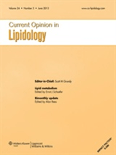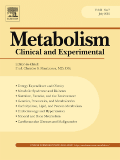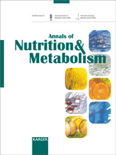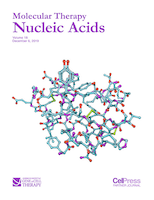
CURRENT OPINION IN LIPIDOLOGY
Scope & Guideline
Exploring the forefront of lipid science.
Introduction
Aims and Scopes
- Lipid Metabolism and Disorders:
The journal extensively covers various aspects of lipid metabolism, including the roles of different lipoproteins, lipid disorders such as familial hypercholesterolemia, and the genetic underpinnings of these conditions. - Cardiovascular Disease (CVD) and Lipids:
A significant focus is placed on the relationship between lipid levels and cardiovascular risk, with discussions on lipid-lowering therapies, the impact of lipoproteins on atherosclerosis, and emerging insights into cardiovascular health. - Innovative Therapeutics and Interventions:
The journal highlights novel therapeutic strategies for managing dyslipidemia and related cardiovascular risks, including the exploration of new drug classes and genetic therapies. - Translational Research:
There is a strong emphasis on translating basic research findings into clinical applications, examining how discoveries in lipid biology can inform patient care and treatment protocols. - Emerging Biomarkers and Risk Assessment:
The journal discusses the use of new biomarkers and genetic testing in the assessment and management of lipid disorders, enhancing the understanding of individual patient risk profiles.
Trending and Emerging
- Genetic and Genomic Insights into Lipid Disorders:
There is a growing emphasis on the role of genetics in lipid metabolism and disorders, including familial hypercholesterolemia, highlighting the potential for personalized medicine in lipid management. - Innovative Lipid-Lowering Therapies:
Emerging therapies, particularly those targeting specific proteins like PCSK9 and ANGPTL3, are gaining traction, showcasing the journal's focus on novel pharmacological interventions. - Interplay Between Lipids and Systemic Conditions:
Research is increasingly exploring the connections between lipid metabolism and other systemic conditions, such as diabetes, liver disease, and inflammation, reflecting a more integrated understanding of metabolic health. - Impact of Lifestyle Factors on Lipid Profiles:
There is an uptick in studies examining how lifestyle changes, including diet and exercise, influence lipid profiles and cardiovascular risk, indicating a holistic approach to lipid management. - Technological Advances in Lipid Measurement:
The journal is also highlighting advancements in methodologies for lipid measurement and analysis, such as lipidomics, which are crucial for understanding lipid function and pathology.
Declining or Waning
- Traditional Dietary Approaches to Lipid Management:
There is a noticeable decrease in publications centered on traditional dietary interventions for lipid management, as the focus has shifted towards pharmacological and genetic approaches. - Basic Mechanisms of Lipid Biochemistry:
While foundational research remains important, there appears to be a waning interest in purely biochemical studies of lipids, with a greater emphasis on clinical applications and implications. - Generalized Lipid Profiles without Contextual Risk Factors:
Publications that discuss lipid profiles in isolation, without considering their contextual relationship with other risk factors for cardiovascular disease, are becoming less common, reflecting a shift towards integrated risk assessment.
Similar Journals

Journal of Clinical and Translational Endocrinology
Empowering Knowledge in Clinical and Translational Endocrinology.Journal of Clinical and Translational Endocrinology is a peer-reviewed open access journal published by Elsevier that has been serving the endocrinology community since its inception in 2014. With an ISSN of 2214-6237, this journal focuses on the critical intersection of clinical and translational research in endocrinology, diabetes, and metabolism, offering insights that bridge laboratory discoveries with patient care. It holds a commendable position in the field, ranking Q3 for Endocrinology and Q2 for Endocrinology, Diabetes, and Metabolism, reflecting its rigorous standards and relevance to contemporary research. Situated in the Netherlands, the journal’s aim is to foster knowledge dissemination and collaboration among professionals, researchers, and students alike, ensuring high visibility in a rapidly evolving field. The journal is committed to open access, allowing immediate access to research findings, thus maximizing their impact and facilitating advancements in clinical practice and research. With an H index that showcases its contribution to the field, Journal of Clinical and Translational Endocrinology is an essential resource for anyone invested in advancing endocrinological science.

BIOCHIMICA ET BIOPHYSICA ACTA-MOLECULAR AND CELL BIOLOGY OF LIPIDS
Bridging Molecular Insights and Cellular ApplicationsBIOCHIMICA ET BIOPHYSICA ACTA-MOLECULAR AND CELL BIOLOGY OF LIPIDS, published by Elsevier, is a leading academic journal that focuses on advancing the field of lipid biology. With an ISSN of 1388-1981 and an E-ISSN of 1879-2618, this journal has established itself as an essential resource for researchers, professionals, and students interested in cell and molecular biology, particularly regarding lipid interactions and functions. The journal boasts an impressive impact factor, standing in the top quartiles of its categories—Q1 in Molecular Biology and Q2 in Cell Biology. As part of the vibrant academic landscape of the Netherlands, it supports both traditional and open access publication models, ensuring that vital research is accessible to a global audience. The converged years from 1998 to 2025 mark its sustained commitment to quality and relevance in the fast-evolving field of lipid research. With a strong ranking in Scopus and a percentile in the 80th range in both Molecular Biology and Cell Biology, this journal continues to be a pivotal platform for scholarly communication and innovation in lipid-related research.

METABOLISM-CLINICAL AND EXPERIMENTAL
Driving Discovery in Clinical Metabolism and HealthMETABOLISM-CLINICAL AND EXPERIMENTAL is a premier academic journal published by W B SAUNDERS CO-ELSEVIER INC, with a distinguished history dating back to 1952. This journal serves as a vital repository of knowledge in the fields of Endocrinology, Diabetes, and Metabolism, consistently ranking in the top quartile (Q1) within these categories according to the latest metrics. With an impressive impact factor and recognized for its contributions to Biochemistry, Genetics, and Molecular Biology, it ranks #5 out of 128 in the Scopus database for Endocrinology and #11 out of 244 for Medicine related to Endocrinology, Diabetes, and Metabolism, placing it in the 95th and 96th percentiles, respectively. While the journal does not currently offer open access, it maintains rigorous peer review standards and publishes cutting-edge research that drives forward the understanding of metabolic diseases and clinical practices. By engaging with METABOLISM-CLINICAL AND EXPERIMENTAL, researchers, healthcare professionals, and students can explore groundbreaking advancements and pivotal findings that shape the future of metabolic health.

Nature Metabolism
Exploring the intricate connections of metabolism and disease.Nature Metabolism, published by NATURE PORTFOLIO, is a leading journal dedicated to advancing the field of metabolic research and its implications across various biological systems. Since its inception in 2019, this esteemed journal has rapidly established itself as a vital resource for researchers, professionals, and students alike, reflecting its prominence through a prestigious Q1 ranking in several key categories including Cell Biology, Endocrinology, Diabetes and Metabolism, Internal Medicine, and Physiology. With an impressive Scopus ranking, underscoring its impact in Medicine and Biochemistry disciplines, Nature Metabolism offers an exceptional platform for disseminating high-quality research that explores the intricate mechanisms of metabolism and its association with health and disease. Although currently not open access, it continues to gain visibility and appreciation within the scientific community, ensuring that groundbreaking findings reach interested audiences globally from its hub in Berlin, Germany. Whether you are an experienced researcher or an aspiring student, Nature Metabolism serves as an invaluable asset in navigating the complexities of metabolic science.

JOURNAL OF MEMBRANE BIOLOGY
Innovating Insights into Membrane BiologyWelcome to the Journal of Membrane Biology, a premier publication dedicated to advancing our understanding of the complex roles membranes play in biological systems. Published by Springer, this journal features research articles, reviews, and communications on a broad range of topics related to membrane biology, including biomolecular interactions, transport mechanisms, and physiological responses. With an ISSN of 0022-2631 and E-ISSN 1432-1424, the journal has been a cornerstone in the field since its inception in 1969 and continues to thrive as it looks towards 2024. Ranked in the second quartile (Q2) for Biophysics and Physiology, and third quartile (Q3) in Cell Biology, it showcases impactful research that embodies the spirit of scientific inquiry and innovation. Although currently not an Open Access journal, it remains easily accessible to researchers, professionals, and students eager to delve into the dynamic world of membrane studies. As the understanding of membrane dynamics expands, so does its relevance in areas such as drug development and cellular engineering, making the Journal of Membrane Biology an essential resource for those at the forefront of these critical scientific advancements.

CHEMISTRY AND PHYSICS OF LIPIDS
Unraveling the mysteries of lipids in health and disease.Chemistry and Physics of Lipids is a prestigious and influential journal dedicated to advancing the understanding of lipid chemistry and biophysics. Published by Elsevier Ireland Ltd, it serves as a vital resource for researchers and professionals in the fields of biochemistry, cell biology, and molecular biology. The journal has a strong standing within the academic community, as reflected in its 2023 Scopus rankings, where it places in the 82nd percentile for organic chemistry and maintains significant positions in various biochemistry subfields. Spanning from 1966 to 2024, it fosters a comprehensive discourse on lipid-related research and innovation. As a renowned publication in the Q2 and Q3 quartiles across several categories, it supports the dissemination of high-quality research aimed at elucidating lipid functions and their implications in health and disease. Researchers and students alike will find this journal invaluable for staying updated with the latest developments and trends in lipid research.

ANNALS OF NUTRITION AND METABOLISM
Transforming Understanding of Dietary Impacts on HealthANNALS OF NUTRITION AND METABOLISM is a prestigious academic journal dedicated to advancing the fields of nutrition and metabolism, published by KARGER, a renowned publisher known for its commitment to high-quality research dissemination. Founded in 1959, this journal has established itself as a crucial resource for researchers and practitioners alike, spanning an extensive range of topics that highlight the interplay between diet, health, and disease. Currently seated in Q2 categorically both in Medicine (Miscellaneous) and Nutrition and Dietetics, the journal ranks impressively within the Scopus metrics, showcasing its relevance and impact—positioned at the 80th percentile in Medicine and the 71st percentile in Nutrition. Though not open access, the journal ensures broad accessibility through various academic databases. By focusing on innovative research findings and clinical insights, the ANNALS OF NUTRITION AND METABOLISM aims to foster a deeper understanding of nutritional science, making it an indispensable platform for academics, healthcare professionals, and students alike to enhance their knowledge and contribute to ongoing discussions in this vital field.

HORMONE AND METABOLIC RESEARCH
Decoding Metabolic Pathways Through Hormonal ResearchHORMONE AND METABOLIC RESEARCH, published by GEORG THIEME VERLAG KG, stands as a reputable platform in the fields of biochemistry, endocrinology, and metabolism since its establishment in 1969. This peer-reviewed journal provides critical insights and advancements in the intricate relationships between hormones and metabolic processes, catering to researchers, healthcare professionals, and students alike. With an impressive convergence of knowledge spanning over five decades, it maintains a commendable Q3 ranking in multiple categories, including Biochemistry, Clinical Biochemistry, and Endocrinology, highlighting its contribution to cutting-edge scientific discourse. Although not an open-access journal, it offers a plethora of access options for readers and institutions, ensuring that vital research reaches those who need it most. Located in Stuttgart, Germany, the journal is positioned at the forefront of influential research in hormone and metabolic studies, emphasizing its importance for ongoing investigations into health and disease.

Molecular Therapy Nucleic Acids
Transforming research into breakthroughs in gene therapy.Molecular Therapy Nucleic Acids is a premier open-access journal published by CELL PRESS, dedicated to advancing the field of molecular medicine through the innovative application of nucleic acid-based therapies. Since its inception in 2012, this journal has become an essential resource for researchers and professionals in drug discovery and molecular medicine, reflected in its status as a Q1 journal in both categories for 2023. With a notable impact factor and high rankings in Scopus, including #8 out of 157 in Drug Discovery and #16 out of 178 in Molecular Medicine, it serves to disseminate groundbreaking research and foster collaborations among scientists worldwide. The journal's comprehensive scope encompasses a wide variety of topics, including gene therapy, RNA interference, and CRISPR technology, ensuring that it remains at the forefront of scientific excellence. With open access availability, Molecular Therapy Nucleic Acids actively promotes the widespread dissemination of knowledge, making its crucial insights accessible to students, researchers, and industry professionals alike.

Journal of Atherosclerosis and Thrombosis
Bridging research and practice in cardiovascular health.Journal of Atherosclerosis and Thrombosis is a leading academic publication dedicated to advancing research in the fields of cardiovascular medicine, biochemistry, and internal medicine. Published by the Japan Atherosclerosis Society, this esteemed journal operates from its headquarters in Tokyo, Japan, and has been a vital resource in its area since its inception in 1994. With its robust impact in Cardiology and Cardiovascular Medicine, ranking in the top quartile (Q1) as of 2023, and a commendable standing in Internal Medicine and Biochemistry, the journal fosters an environment of innovation and discovery, showcasing significant studies and advancements that shape clinical practices and therapeutic approaches. Though not an open-access publication, it offers a wealth of insights to researchers, professionals, and students seeking to deepen their understanding of atherosclerosis and thrombosis. By continually featuring high-quality articles, the Journal of Atherosclerosis and Thrombosis plays an essential role in bridging the gap between research and practice, facilitating critical conversations that influence the future of cardiovascular health.